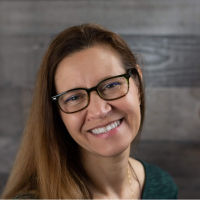
 Image credit: By Michael Lorenzo,FreeImages.com (2007), CC0/PD[/caption]
I like to pretend I have it all together. I can raise a family, work in ministry, and make amazing cupcakes too! The truth is that I wake up in a panic (more times then I’ll admit), I’m hanging onto to all the work by a thread, and I didn’t post my disastrous kitchen or the cupcakes that crumbled when I tried to take the wrappers off (yup, it happened)!
I often feel inadequate or stressed in my roles as wife, mother, ministry leader, and all the other things I try to be. When I am struggling, I need a little help or direction, but where to turn? Sometimes I just need quiet time in prayer, Mass and/or Adoration, but at other times I need more.
Spiritual Direction: Direction is not a counseling process, but rather a guided journey to lead you into ways to deepen your relationship with God. The focus is less about self-discovery and more about growth in spirituality and measurement of that growth. Spiritual directors are trained in direction and are often priests or religious sisters or brothers. They must be well-versed in faith issues and resources in order to recommend spiritual reading or resources to the people they provide direction to. An example of spiritual direction may be a priest assisting and challenging someone who wants to reflect more deeply in an examination of conscience for a better confession.
Spiritual Counseling: Spiritual counseling digs deeper into the hurt or brokenness that an individual may be experiencing. As the name implies, the person providing the counseling is usually a psychologist, psychiatrist or licensed social worker. The spiritual component is support through the client’s [Catholic] belief system, while still utilizing psychological principles and knowledge. An example of spiritual direction might be an adult child of an alcoholic father who struggles with drawing close to the idea of God as father because of unresolved pain.
Catholic Coaching: Coaching is not counseling or direction, although it may have a strong spiritual component. In her coaching business, True Vine Coaching, Lisa Mladinich describes coaching as being about your “best life!” She lists four elements: breakthrough, empowerment, satisfaction, and teaching, that are at the heart of coaching. Lisa states,
Image credit: By Michael Lorenzo,FreeImages.com (2007), CC0/PD[/caption]
I like to pretend I have it all together. I can raise a family, work in ministry, and make amazing cupcakes too! The truth is that I wake up in a panic (more times then I’ll admit), I’m hanging onto to all the work by a thread, and I didn’t post my disastrous kitchen or the cupcakes that crumbled when I tried to take the wrappers off (yup, it happened)!
I often feel inadequate or stressed in my roles as wife, mother, ministry leader, and all the other things I try to be. When I am struggling, I need a little help or direction, but where to turn? Sometimes I just need quiet time in prayer, Mass and/or Adoration, but at other times I need more.
Spiritual Direction: Direction is not a counseling process, but rather a guided journey to lead you into ways to deepen your relationship with God. The focus is less about self-discovery and more about growth in spirituality and measurement of that growth. Spiritual directors are trained in direction and are often priests or religious sisters or brothers. They must be well-versed in faith issues and resources in order to recommend spiritual reading or resources to the people they provide direction to. An example of spiritual direction may be a priest assisting and challenging someone who wants to reflect more deeply in an examination of conscience for a better confession.
Spiritual Counseling: Spiritual counseling digs deeper into the hurt or brokenness that an individual may be experiencing. As the name implies, the person providing the counseling is usually a psychologist, psychiatrist or licensed social worker. The spiritual component is support through the client’s [Catholic] belief system, while still utilizing psychological principles and knowledge. An example of spiritual direction might be an adult child of an alcoholic father who struggles with drawing close to the idea of God as father because of unresolved pain.
Catholic Coaching: Coaching is not counseling or direction, although it may have a strong spiritual component. In her coaching business, True Vine Coaching, Lisa Mladinich describes coaching as being about your “best life!” She lists four elements: breakthrough, empowerment, satisfaction, and teaching, that are at the heart of coaching. Lisa states,
Coaching often involves mentoring (i.e., “Here’s what I have done that might help you …”), but the principal dynamic of a “coaching conversation” is that the coach listens and asks powerful questions, to help the client hear his/her own heart on a deeper level, so they can get in touch with the voice of God in their lives. In secular coaching, it’s about creating a vision for the life they desire, whereas in the faith-based coaching world, it’s about discernment first and creating, later.I have worked with Lisa, and she is gifted at uncovering the questions you need to ask and answer yourself. One client was able to change his career path after only one session and hasn’t looked back. Years ago, I trained as a parent coach, to help assist parents navigate difficulties and learn new skills in parenting. These are areas that a skilled coach can help you improve upon. In case you are wondering, I have utilized all three types of help at different points in my life. Reaching out for assistance and/or direction is not a sign of weakness, but it is an act of humility. It is a recognition that we can not always manage every issue alone. Pray about who can help and reach out. It can change your life! Now, about those cupcakes …
Copyright 2019 Mary Lou Rosien
About the Author

Mary Lou Rosien
Mary Lou Rosien is a Catholic wife, mom to seven, educator, writer, and speaker. She is the author of several books including Three Things Divorced Catholics need to Know and The Joy-Filled Broken Heart. She is known for her love of all things cooking and baking, especially “Friday cookies.” Visit her at CatholicFamilyBootCamp.com.


.png?width=1806&height=731&name=CatholicMom_hcfm_logo1_pos_871c_2728c%20(002).png)
Comments